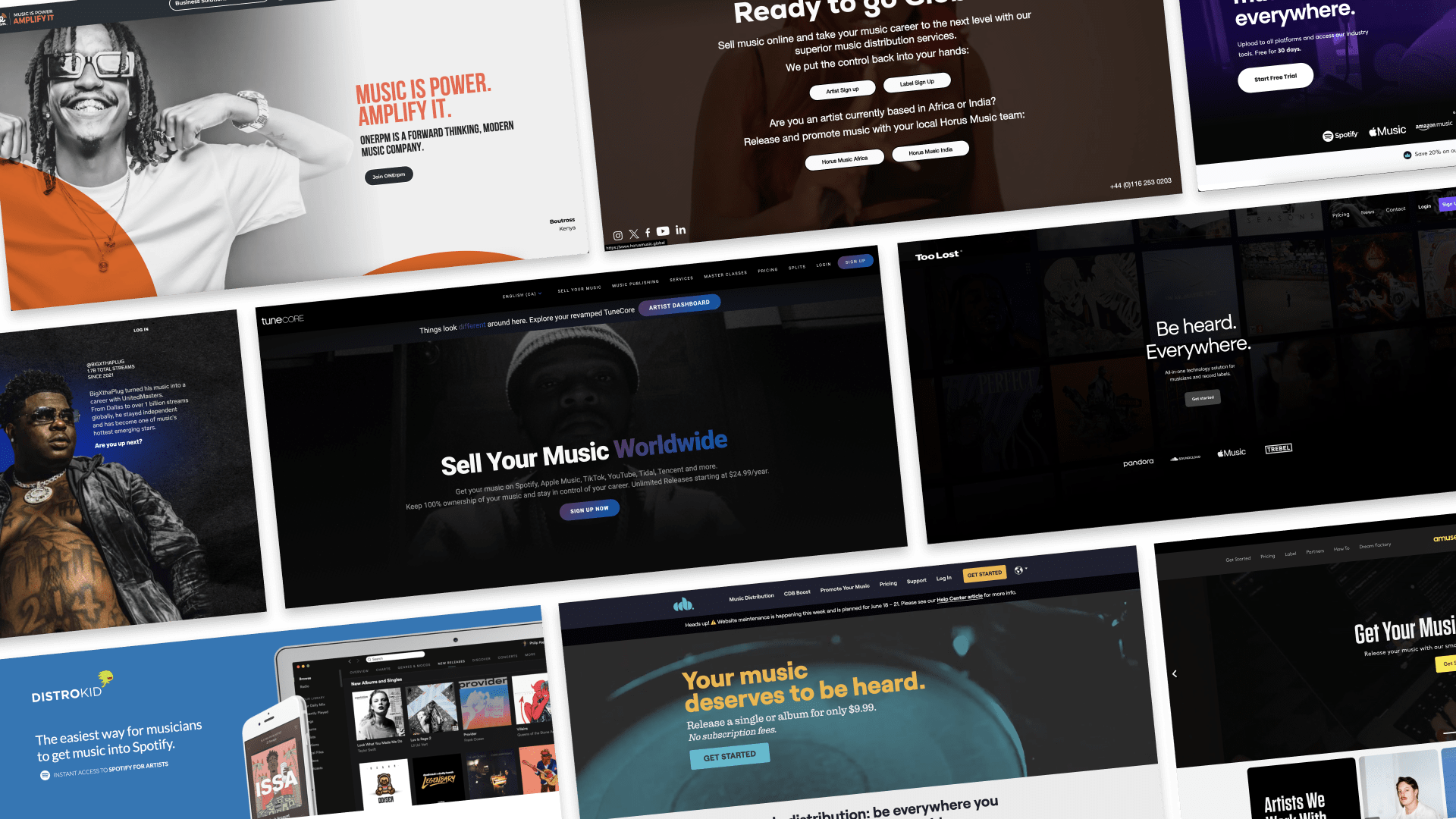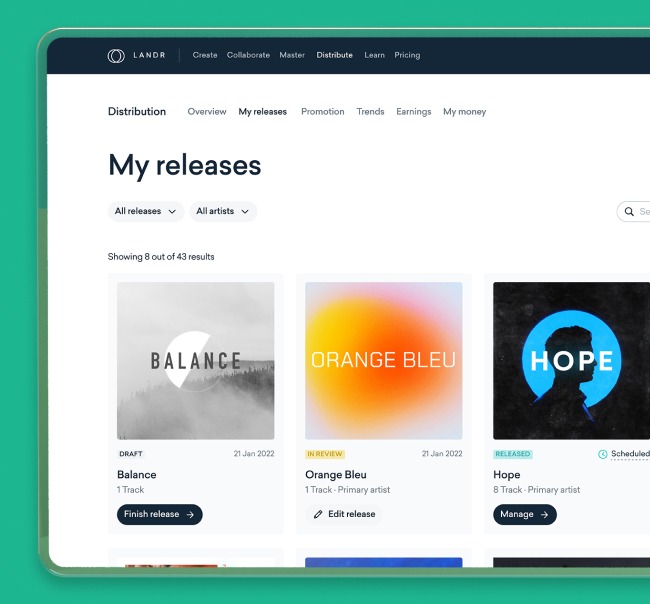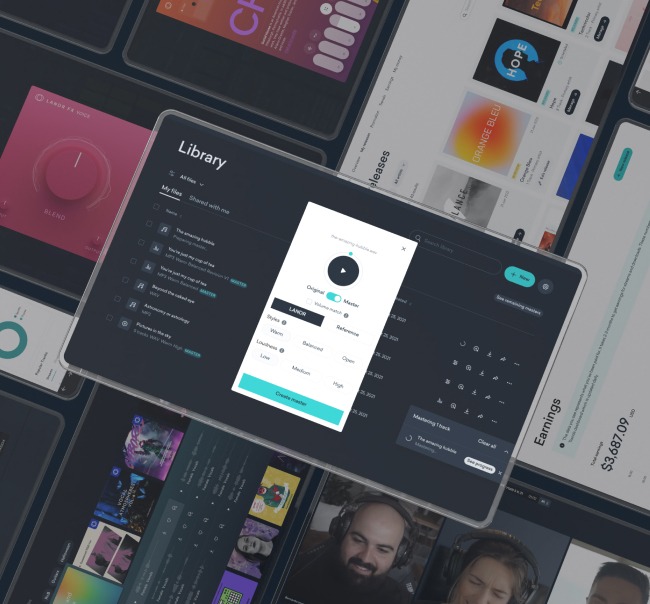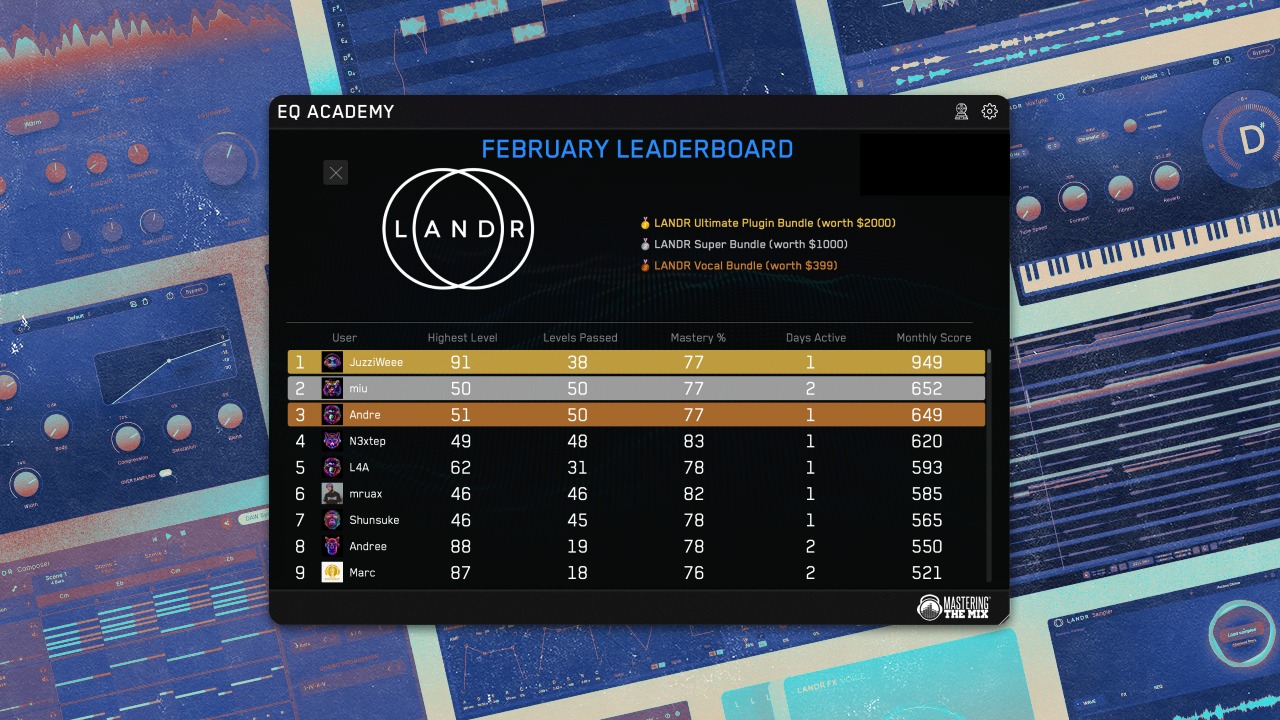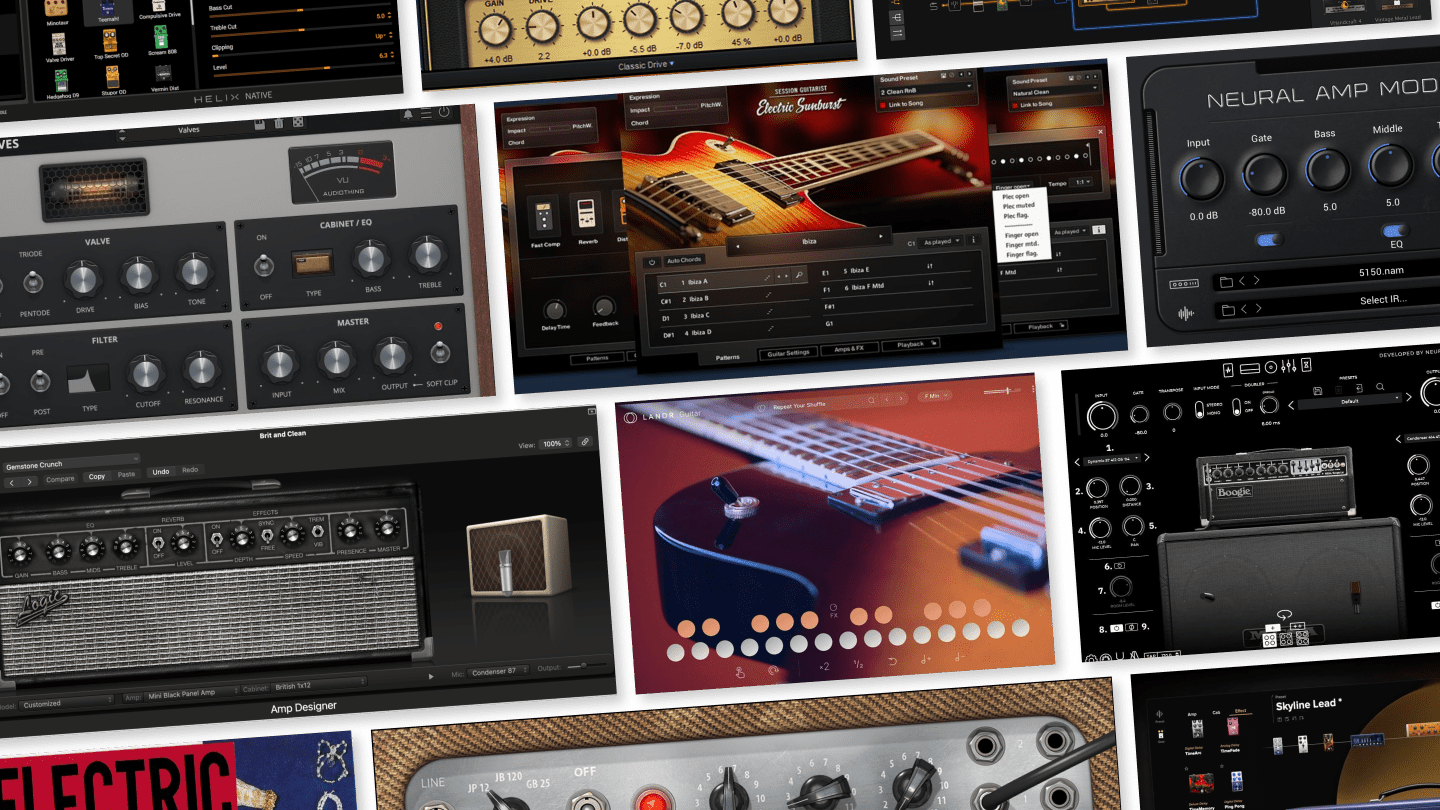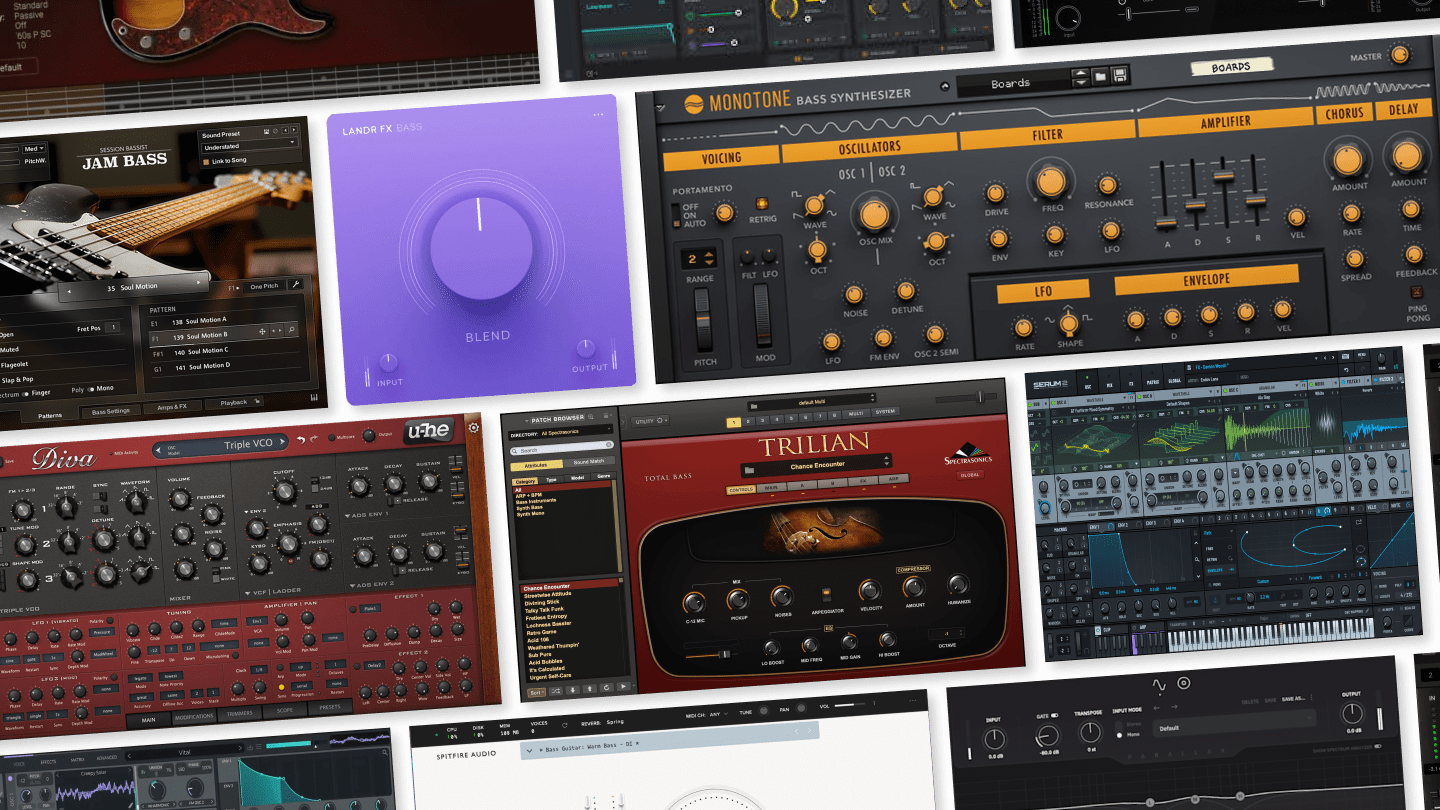
7 Best DistroKid Alternatives for Musicians in 2026

If you’re looking for DistroKid alternatives, there are plenty to consider, but not all of them are created equal.
The world of independent music distribution is the biggest it’s ever been, and musicians are faced with a lot of options when it comes to getting their music heard.
DistroKid is a major player in this arena, but they may not quite make the cut for artists who are looking for the best deal. In this article we’ll explore why and take a look at the main options you have to consider.
Why look for DistroKid alternatives?
DistroKid has been a popular music distribution service for quite some time, but as the world of music distribution has evolved, their offering has been outpaced by other providers. This is particularly true when it comes to customer service, pricing, and transparency.
DistroKid leans pretty heavily on chatbot support rather than human support, making it pretty difficult for artists to get ahold of someone when they need help with their releases.
In addition to this, they tend to charge extra fees for services that other distributors include in the base price of the subscription, such as YouTube Content ID, discovery on Shazam, and the ability to leave your music up on streaming and download services even if you cancel.
They also charge recurring annual fees for each cover song you want to license, while other distributors like LANDR will license cover songs for a one-time fee per song only.
These extra fees can be tricky to spot when starting and administering your account, and they can also add up fast. So, for artists who want a better deal, it can be well worth seeking out DistroKid alternatives to make sure you earn as much as possible from your music.
What to look for in a music distribution service
When choosing a music distribution service (whether or not you’re looking for a DistroKid alternative), it is important to prioritize global reach, fair pricing, and control over your rights and revenue. A reliable distributor should send your music to all major platforms such as Spotify, Apple Music, TikTok, and Instagram, while allowing you to keep full ownership of your master recordings.
Fast turnaround times and flexible release scheduling can make a big difference, especially in a fast-moving industry. Look for clear, upfront pricing that avoids hidden fees, and consider whether the platform offers different plan options to match your specific release needs.
The best services also support your long-term growth as an artist. This includes offering detailed analytics, promotional tools like smart links, and affordable licensing options for cover songs. Access to real customer support is also essential when you run into technical issues or have questions.
Ideally, your distributor should provide more than just delivery. Look for a platform that helps you produce, release, and promote your music with the tools you need at each stage of your creative journey.
Top 7 DistroKid alternatives
Without further ado, let’s dig into the DistroKid alternatives you should consider when deciding on a music distribution service.
1. LANDR
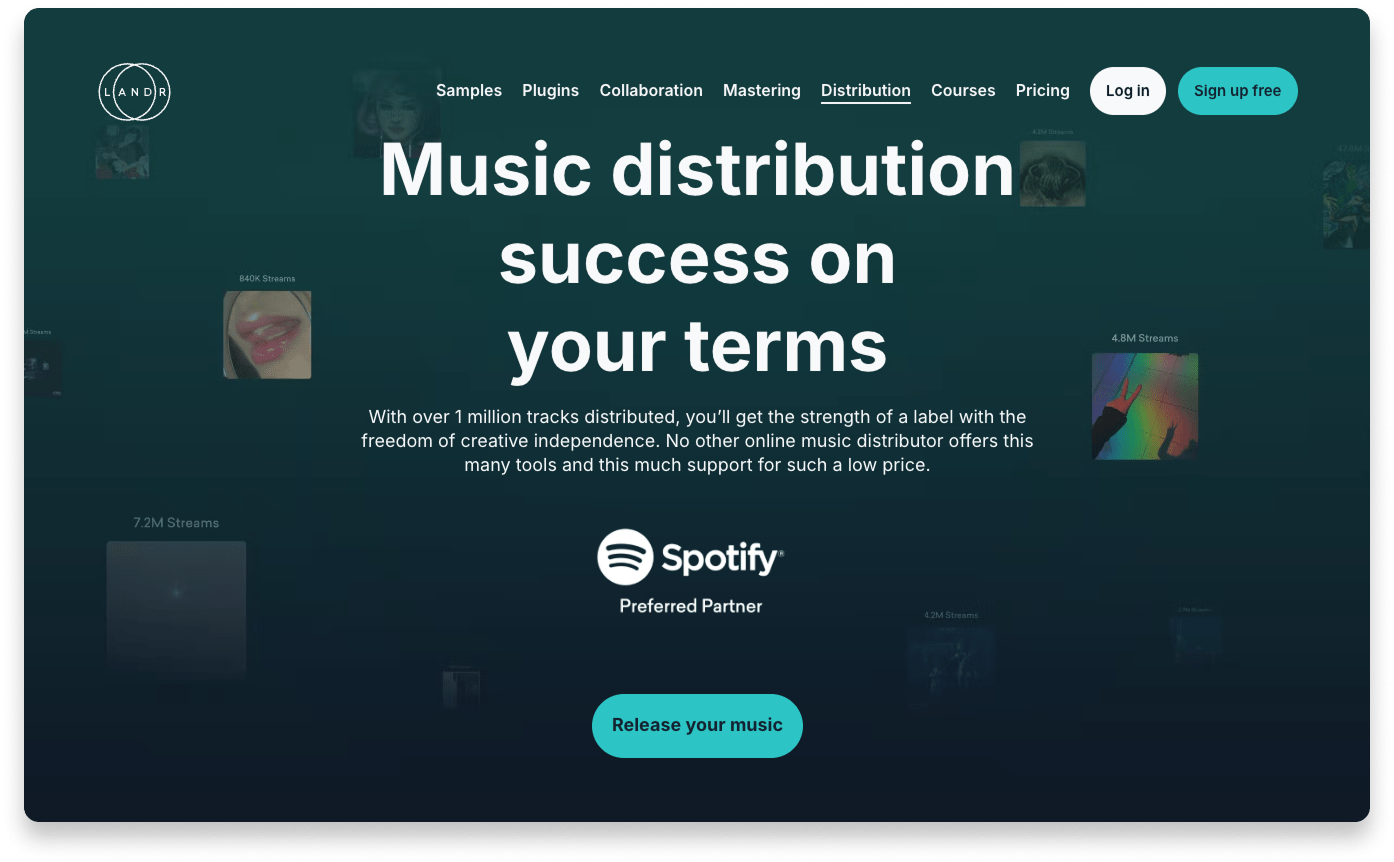
LANDR offers a wide range of essentials for artists of all levels, including distribution. Both distribution plans will get your music on 150+ platforms including all of the major ones, while the Pro subscription offers faster release times, priority support, and a more advanced overall feature set. Crucially, artists get 100% of their royalties and keep 100% ownership of their music no matter what tier they choose.
On top of this, however, LANDR Studio offers a high-value package that combines distribution with their famous AI mastering engine, thousands of dollars worth of pro-grade plugins (including two DAWs), and access to a library of over 3 million royalty-free samples. In other words, everything you need to create and release music. This makes LANDR very competitive as a DistroKid alternative.
Pricing: Distribution starts at $23.99/year
Pros:
- Straightforward and transparent pricing
- Real, reliable human support
- Comprehensive offering in Studio subscription
Cons:
- No free tier available
- Fewer advanced promotional tools than some competitors
2. TuneCore
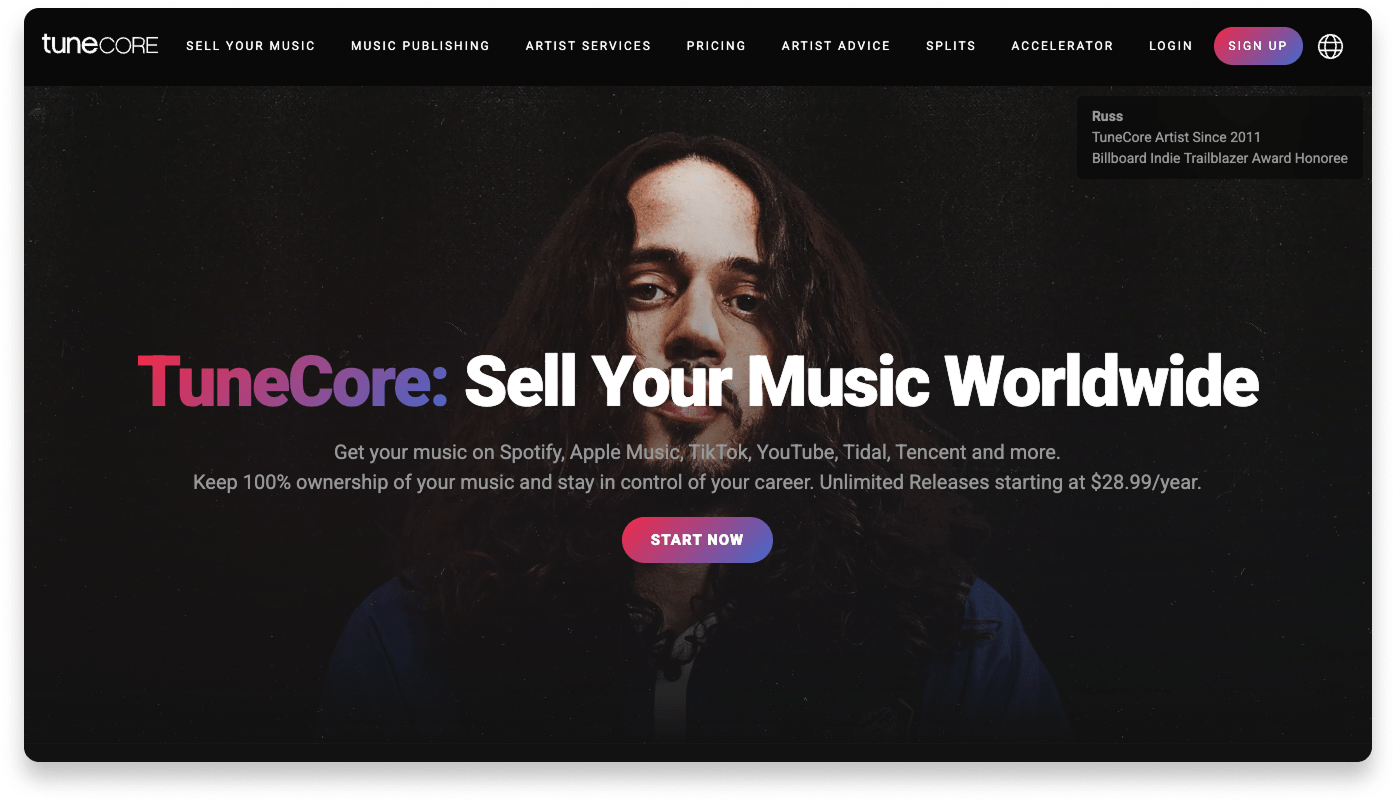
TuneCore is a veteran in the digital distribution space and offers a strong global presence with access to all major streaming platforms. It allows artists to keep 100% of their royalties and ownership of their work. In addition to distribution, TuneCore offers help with music publishing and sync licensing, along with promotional and partnership opportunities.
However, the cost of additional features can really add up over time. Just to name a few, you’ll have to pay an additional $18.99 per year for each artist you add to your account, a $75 setup fee for music publishing administration, a 15% cut of publishing royalties, and a 50% commission on sync placements. Whether or not this feels like a worthwhile DistroKid alternative will depend on your output and your needs as an artist.
Pricing: Starts at $22.99/year
Pros:
- Artists retain full royalties
- Extensive add-on services including publishing and sync
- Trusted and widely recognized platform
Cons:
- Annual fees per release can be very costly over time
- Some advanced features require additional payments
3. CD Baby
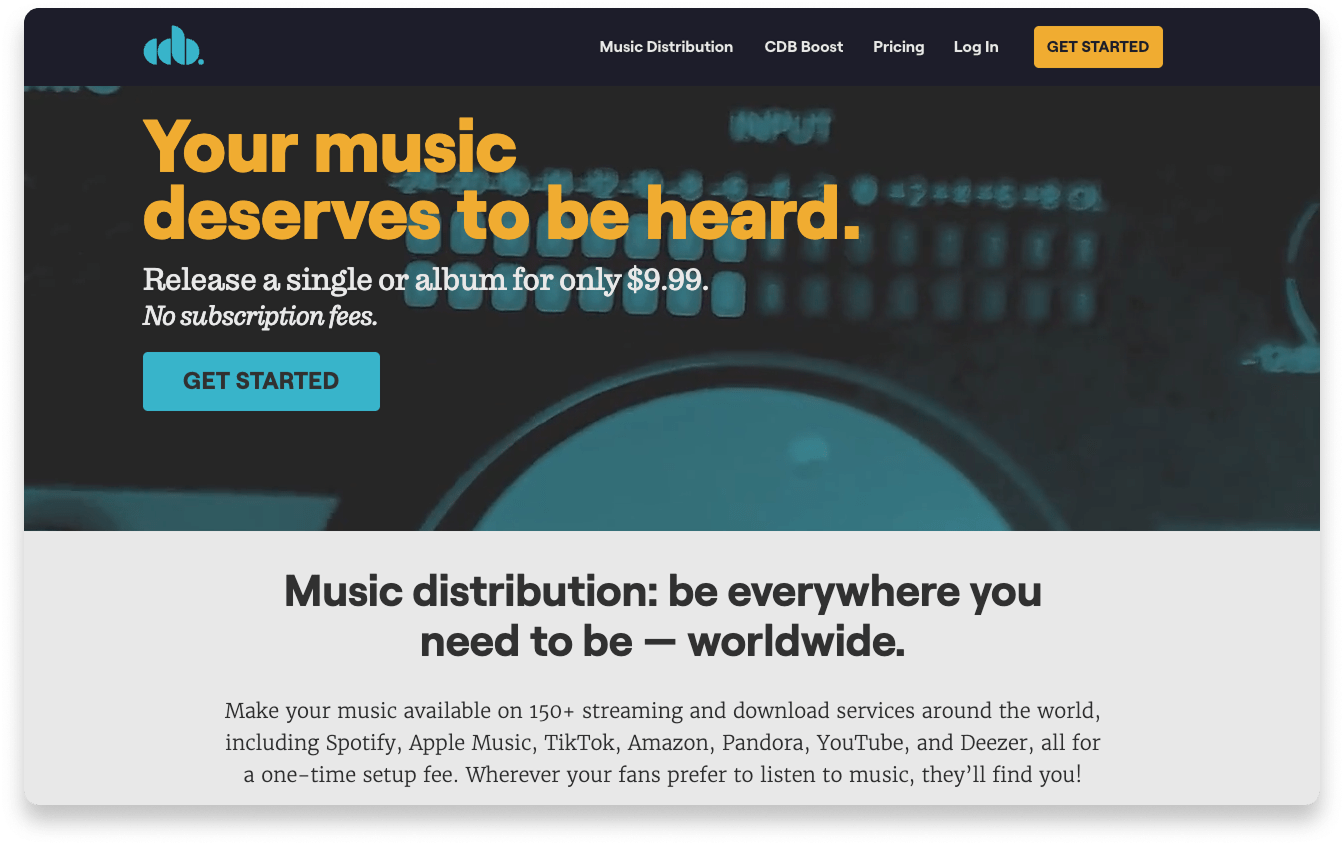
CD Baby has been around since the early 2000s and remains a reliable name in independent music distribution. It operates on a per-release fee model ($9.99 per release), making it a good fit for artists who don’t release music every month. Beyond digital distribution, it offers promotional tools, sync licensing opportunities, and publishing services.
However, the costs of CD Baby’s commissions and add-on services can add up. They take a 9% cut of download/streaming revenue, for instance. Meanwhile, their sync licensing and publishing admin services cost an additional one-time fee of $39.99 plus commissions. They’ll collect 9% of royalties through SoundExchange, 15% from The MLC, 30% from platforms like YouTube, TikTok, Facebook, and Instagram, and 40% from sync placements.
Pricing: Starts at $9.99 per release + 9% commission on revenue
Pros:
- One-time fee per release (no subscriptions)
- Publishing and sync licensing available
Cons:
- Takes a 9% cut of digital download/streaming revenue
- Publishing and sync licensing requires extra fee per release
- Takes additional cuts from publishing/sync royalties & monetization
- Costs can add up if you’re releasing frequently
4. Amuse
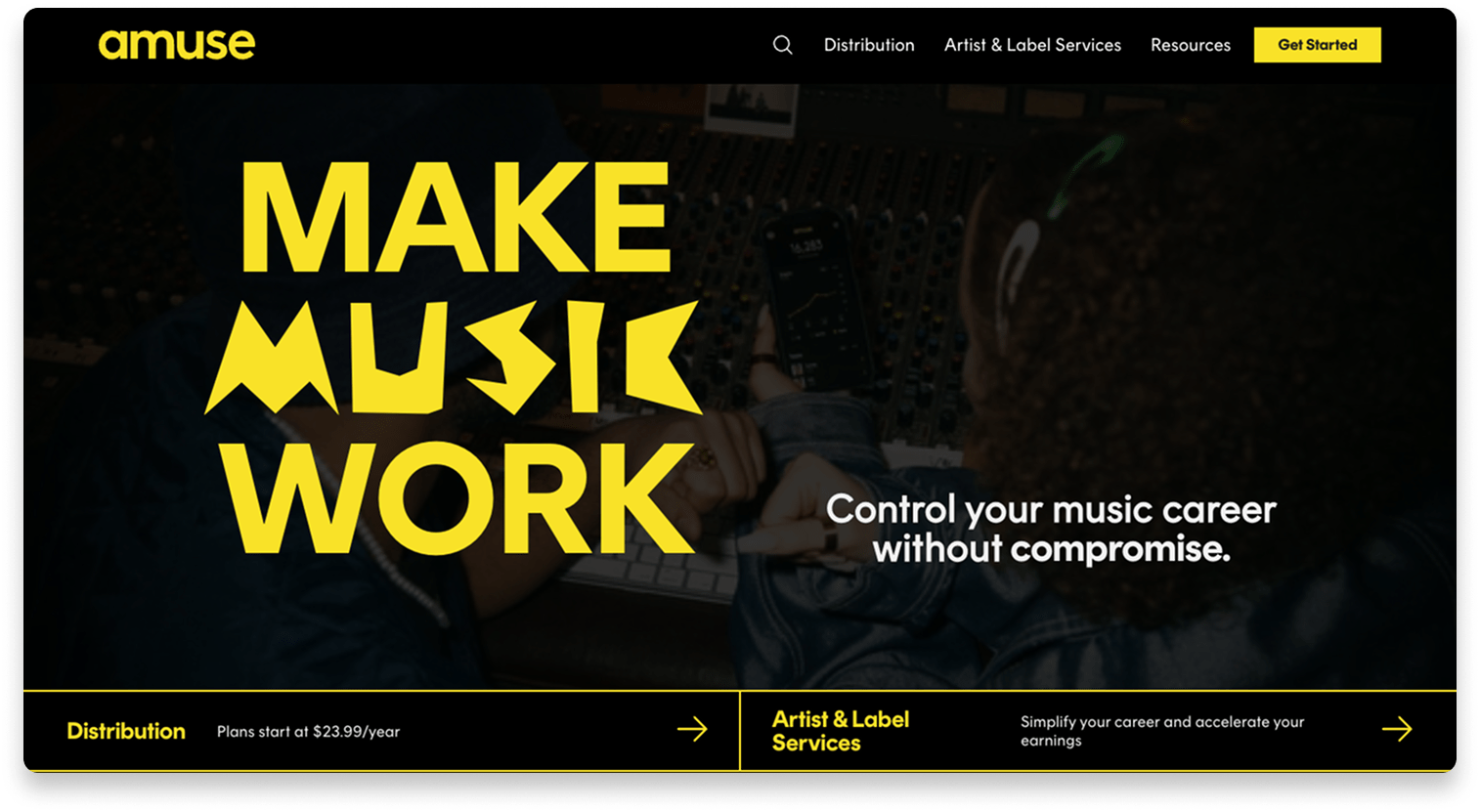
Amuse is a digital music distribution platform that offers artists a few different options for releasing their music. While it once gained popularity for its free plan, Amuse has since shifted to a paid-only model with three tiers: Artist, Artist Plus, and Professional. The platform also offers an Artist and Label Services program for selected artists, which offers perks like tailored promotion and sync licensing management.
However, their Professional tier limits you to 3 artists at $59.99/year unless you want to pay extra, which doesn’t quite measure up to LANDR’s 5 artists for $44.99/year. While their royalty advance feature seems intriguing, only select artists qualify, and it also involves an additional fee which will vary depending on their analysis of your stats.
Pricing: Starts at $23.99/year
Pros:
- Low subscription cost
- Artists keep 100% of royalties
- Royalty advances are possible
- Well-reviewed mobile app
Cons:
- No longer offers a free plan
- Lower maximum artist numbers than some competitors
- Additional fees for more than 3 artists in Professional tier
5. Ditto Music
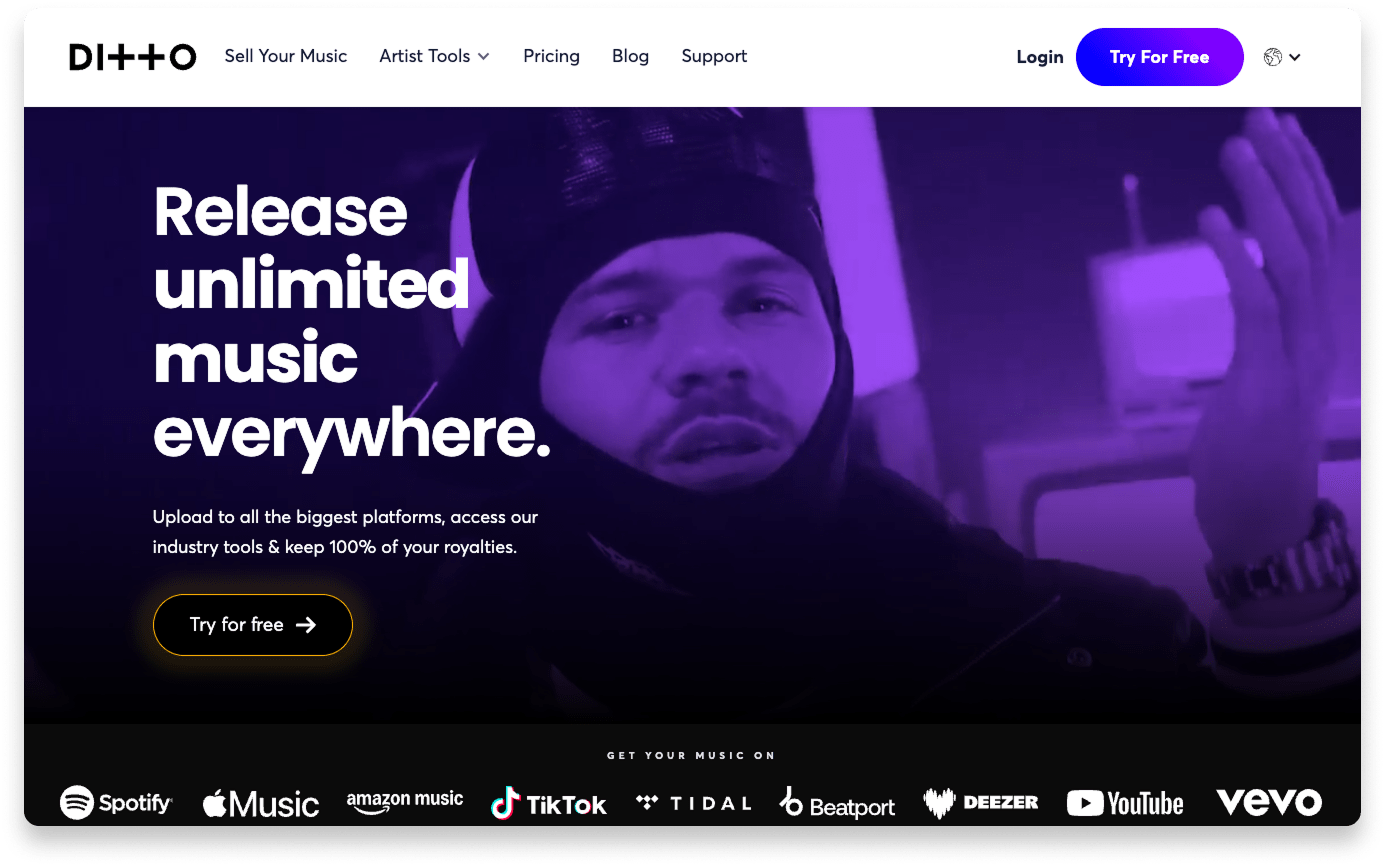
Ditto Music offers unlimited distribution for a flat annual fee and is geared toward independent artists. Depending on which tier is right for you, it also offers label services, promotional tools, sync licensing management and publishing royalty admin. For those running multiple projects or wanting to start a label, Ditto provides flexible plans and a global reach.
However, the lack of a monthly subscription requires a yearly commitment and higher upfront cost, which could be a bit of a barrier for many artists looking for a DistroKid alternative. It is difficult to tell whether the perks of the Pro tier such as sync licence pitching and publishing royalty collection are worth the premium, since they require both a higher subscription fee and commissions (they take 10% of music publishing royalties and 20% for sync placements).
Pricing: Starts at $19/year
Pros:
- Unlimited releases for one annual fee
- Offers label services and other additional perks in higher tiers
Cons:
- Annual-only subscription could be a costly commitment for some
- 2-artist maximum in the Pro tier is low compared to the competition
- Commissions taken on sync licensing and publishing royalty collection
6. RouteNote
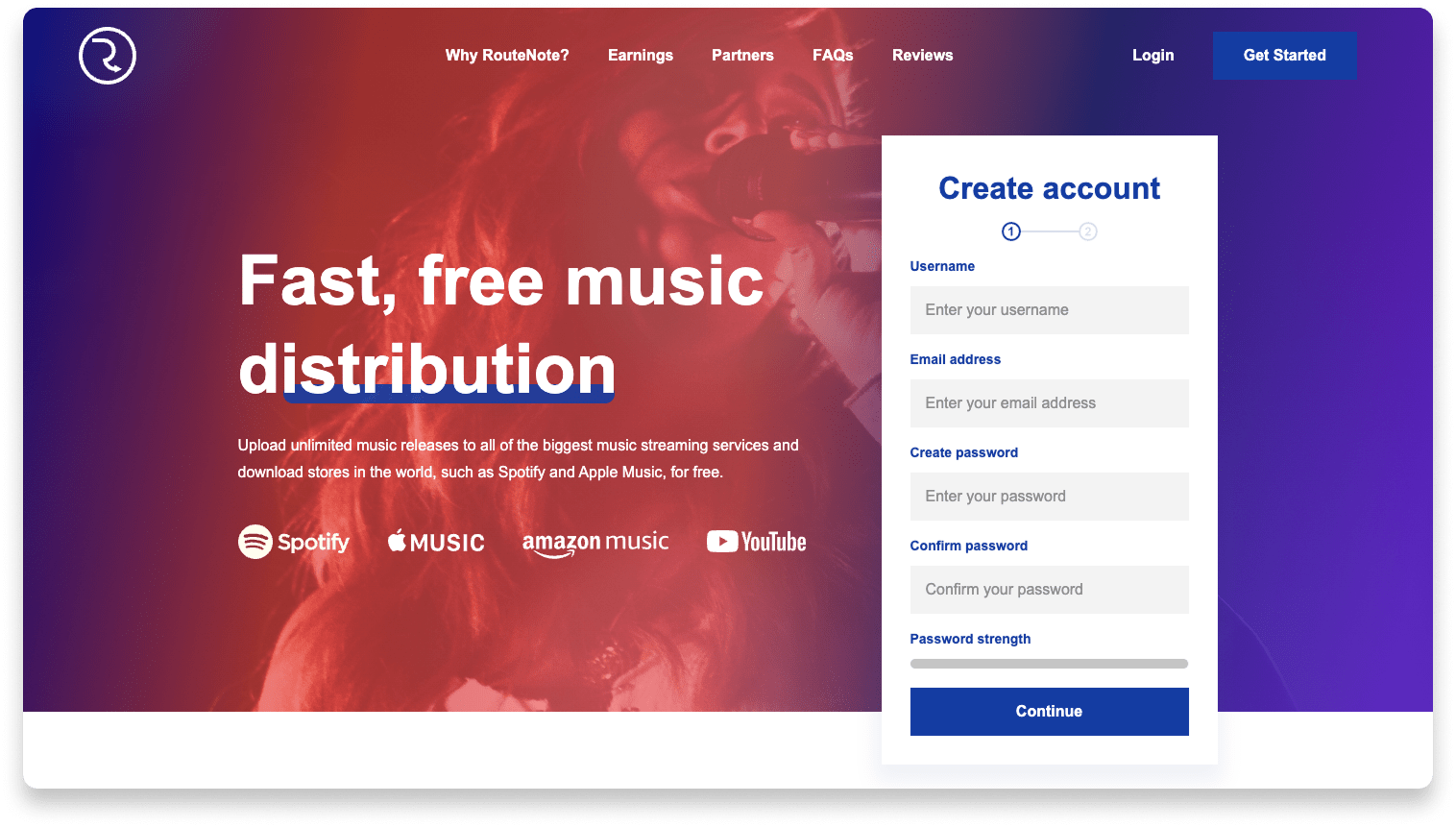
RouteNote is a flexible platform offering a free distribution tier with a 15% commission on royalties and a premium plan with no commission. It seems geared toward artists who are just starting out or want to test releases before investing. With a wide store network and YouTube monetization features, it offers the basics of distribution for a low upfront cost.
For some artists, the 15% commission on all royalties may not be ideal, in which case the Premium tier allows you to retain 100% of your revenue. However, this tier requires a per-release fee based on the release type in addition to an annual renewal fee of $9.99. Depending on how often you release music, this may be more than is worthwhile.
Pricing: Starts at $0 upfront with 15% commission
Pros:
- Free plan available
- Wide distribution reach
- Optional paid upgrade for full royalties
Cons:
- Free plan takes a 15% cut of royalties
- Premium plan costs can quickly add up
- Dashboard and support quality are somewhat inconsistent
7. AWAL
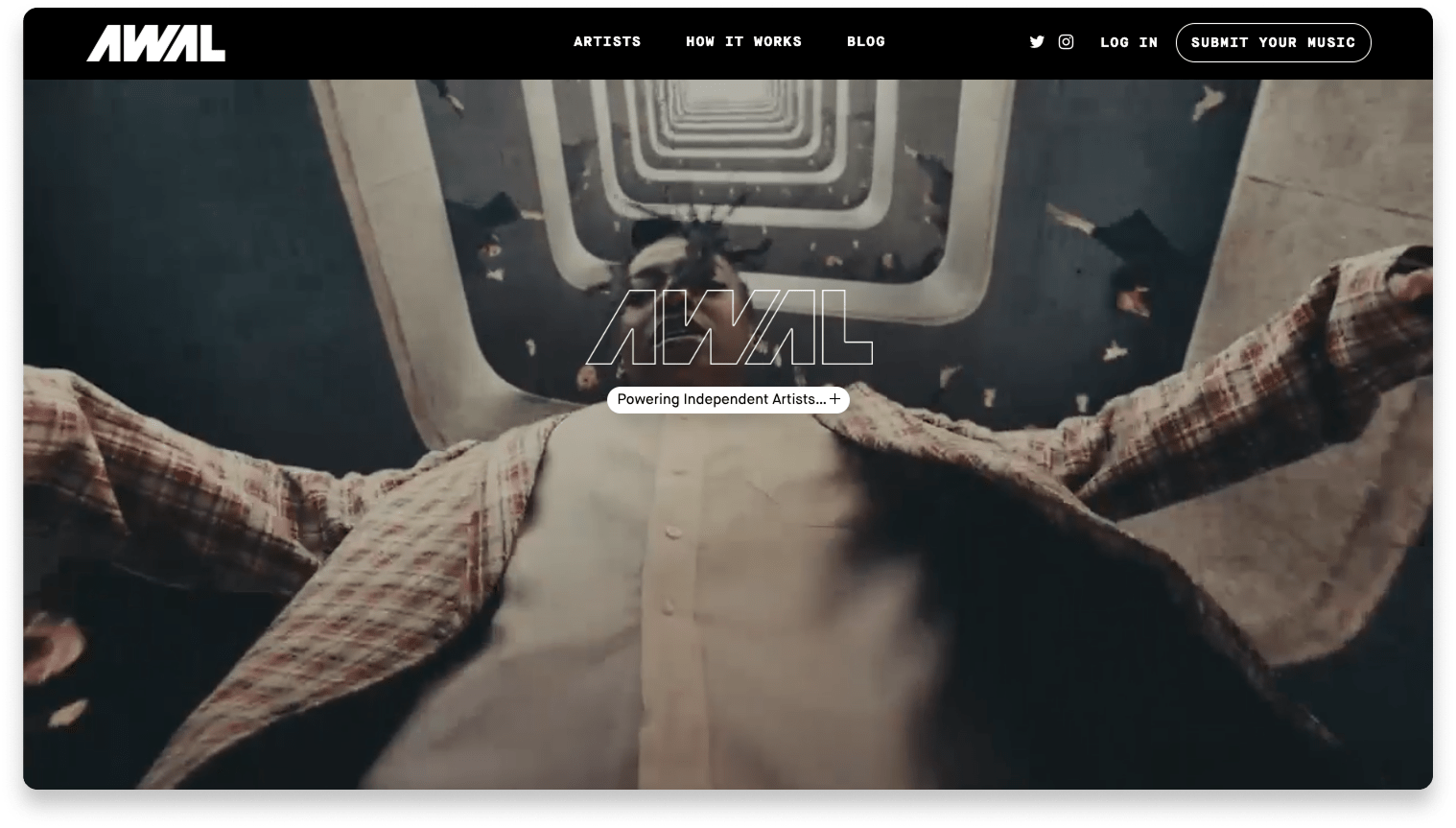
AWAL (Artists Without A Label), now owned by Sony, is a selective distributor designed for more established or fast-growing independent artists. In addition to distribution, it offers premium services like artist funding and representation, PR and marketing, and sync licensing. Though not open to everyone, AWAL is a strong option for those seeking label-level support without giving up ownership. They take artist submissions via their site.
Pricing: 15% commission on all earnings
Pros:
- No upfront fees
- High-level services like funding, promotion, and sync licensing
- Monthly contract terms rather than long-term commitment
Cons:
- Highly curated and requires approval to join
- 15% commission on all earnings
Wrap-up: Making the right choice
The music distribution landscape in 2026 is more diverse than ever, and that’s a good thing for independent artists. While DistroKid has long been a go-to for its flat-rate pricing and ease of use, it no longer stands alone at the top.
From hidden fees to limited support, many artists are finding that a range of DistroKid alternatives might offer more value, flexibility, and long-term support for growing a sustainable music career.
Whether you’re looking for a full creative suite like LANDR, the seasoned reliability of CD Baby, or a high-growth partner like AWAL, the best choice comes down to your needs, release schedule, and goals.
As you weigh your options, focus on what matters most to you, like ownership, support, pricing transparency, or promotional tools. The right distributor won’t just get your music out there, it will help you build a lasting fanbase and presence as an artist.
Gear guides, tips, tutorials, inspiration and more—delivered weekly.
Keep up with the LANDR Blog.
